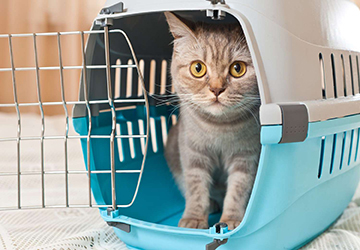What You Should Know Before Adopting a Rescue Cat
Adopting a rescued cat is a selfless act that will enrich the lives of both the adopter and the cat. These felines, often with challenging pasts, look forward to a second chance at a loving home. However, before you take this step, several things must be considered to ensure a seamless transition and a happy life for your new feline companion.
Preparing for a Rescue Cat Adoption
Before you welcome your new furry friend, you must be well-prepared. Adopting a rescued cat involves more than just giving it a new home; it also requires some preparation.

● Safety First: Ensure that your home is cat-proofed. This means securing windows, removing toxic plants, and ensuring there are no accessible small objects that the cat might swallow.
● Supplies: Stock up on necessary supplies such as litter boxes, food and water bowls, cat food, a scratching post, and toys.
● Designate a Safe Space: Your rescue cat might initially feel overwhelmed. Designate a quiet space where they can retreat and feel safe.
Adopting a rescue cat has manifold advantages:
● Saving a Life: The most evident benefit is providing a loving home to a cat in need, potentially saving its life.
● Combat Overpopulation: Many shelters are overcrowded. Adopting helps alleviate this issue and reduces the number of animals euthanized.
● Mature Companions: Many rescue cats are adults, meaning they often arrive litter-trained and have established personalities, reducing some guesswork about their future behavior.
Transitioning a Rescue Cat to a New Home
Bringing home a rescue cat and ensuring a smooth transition requires patience and understanding:
● Give Them Time: Don't be disheartened if your cat hides or appears scared initially. They need time to adjust.
● Routine is Key: Cats thrive on routine. Set specific times for feeding, playing, and other activities to help them feel secure.
● Interaction: Spend quality time with your cat and let them come to you. Forced interactions make them more anxious.
Understanding Rescue Cat Behaviour
Rescue cat behavior can sometimes be different from cats raised in stable homes from kittenhood:
● Trauma: Some rescue cats may have experienced trauma, leading to behaviors like excessive fear, aggression, or shyness. It's essential to approach them with patience and, if needed, consult with a veterinarian or cat behaviorist.
● Health Issues: Ensure you understand entirely your rescue cat's health issues. Regular vet check-ups are crucial.
● Signs of Stress: Recognizing signs of stress or anxiety early can help you address them. This includes excessive grooming, litter box issues, or sudden aggression.
Emotional Needs of a Rescue Cat
Rescue cats often come with a baggage of memories from their previous experiences. While some have been relinquished due to changes in their former owner's circumstances, others may have suffered neglect, abuse, or abandonment. Therefore, it’s vital to understand and cater to their emotional needs.
● Trust-building: This is paramount. Building trust with a rescue cat is a gradual process. Soft speaking, gentle petting, and consistent behavior on your part can go a long way. Avoid loud noises and sudden movements until they're more comfortable.
● Socialisation: Some rescue cats may have needed to be adequately socialized. They may fear other animals or even humans. Gradual introductions to other pets in the house and limited exposure to guests can help them adapt.
● Professional Help: In extreme cases where the trauma is evident in the cat's behavior, seeking assistance from a professional cat behaviorist is recommended. They can provide tailored strategies to help your cat overcome its fears.

The Importance of Early Health Checks
When adopting a rescue cat, it's essential to prioritize their health.
● Immediate Vet Visit: Even if the shelter has recently vetted the cat, a new check-up by your vet is advisable. They can help identify any overlooked issues and provide a health roadmap.
● Vaccinations and Preventatives: Ensure the cat is up-to-date on all vaccinations and is given preventatives for common parasites like fleas, ticks, and worms.
● Dietary Requirements: Discuss the best diet for your rescue cat with the vet. They might have specific nutritional needs, especially if they have been malnourished.
The Long-Term Commitment
Adopting a rescue cat is not a fleeting decision; it's a long-term commitment. A cat's average lifespan ranges from 12 to 15 years; some live well into their twenties.
● Time and Attention: Beyond the initial stages of adoption, your cat will require consistent care, love, and attention throughout life. Regular play sessions, grooming, and bonding time are crucial.
● Financial Consideration: Cats come with expenses — quality food, regular vet checks, toys, litter, and unexpected health issues. Before adopting, ensure you're financially prepared for this commitment.
● Continued Learning: As your cat ages, their needs might change. Staying informed about cat behavior, health trends, and dietary requirements can ensure you provide the best for your feline friend.
Adoption Process and Considerations
Before you even meet your prospective feline friend, the rescue cat adoption process involves a few steps, and it's essential to be prepared:
● Research and Select a Reputable Rescue: All rescues are not created equal. Look for ones with positive reviews, transparent policies, and a clear mission to ensure the well-being of the animals.
● Interviews and Home Visits: Some rescues might require an interview or a home visit. This is to ensure that you are a suitable pet owner and that your home is safe and accommodating for the cat.
● Adoption Fees: Almost all rescues will require an adoption fee. This fee generally covers initial vet visits, vaccinations, and spaying/neutering and helps support the rescue's ongoing efforts.
Conclusion:
In wrapping up, while the journey of adopting a rescue cat can initially seem daunting, the rewards are unparalleled. The joy and companionship they bring and the knowledge that you've given a once-forgotten animal a loving home make all the challenges worthwhile. With understanding, patience, and dedication, your rescue cat can transform from a wary, scared animal into a devoted, purring family member.




